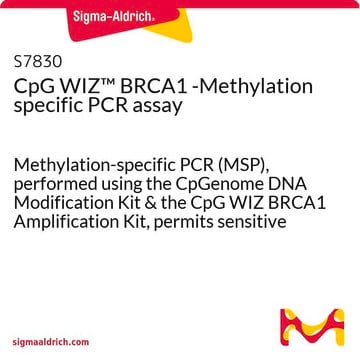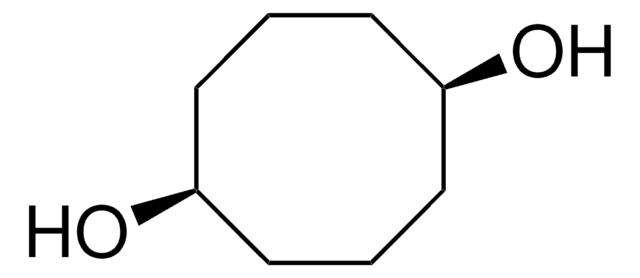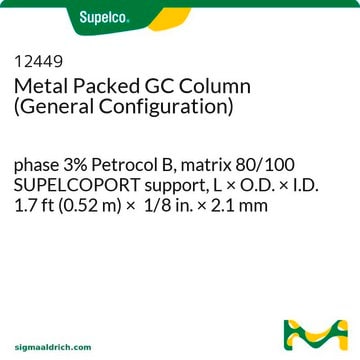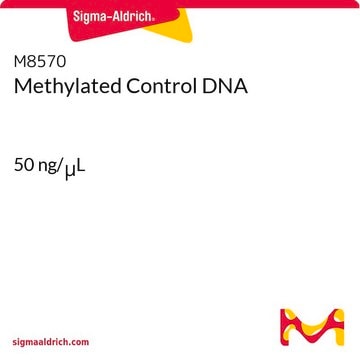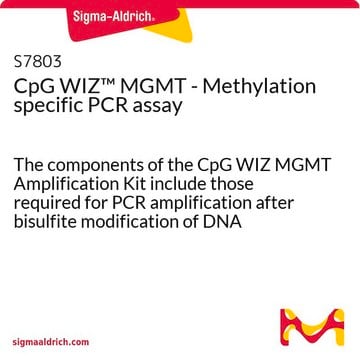S7810-M
CpG WIZ™ RB1 - Methylation specific PCR assay
MSP, performed using the CpGenome DNA Modification Kit & the CpG WIZ RB1 Amplification Kit, permits sensitive detection of altered DNA.
Se connecterpour consulter vos tarifs contractuels et ceux de votre entreprise/organisme
About This Item
Code UNSPSC :
12161503
eCl@ss :
32161000
Nomenclature NACRES :
NA.31
Produits recommandés
Niveau de qualité
Espèces réactives
human
Fabricant/nom de marque
CPGWIZ™
Chemicon®
Technique(s)
PCR: suitable
Numéro d'accès NCBI
Numéro d'accès UniProt
Application(s)
genomic analysis
Informations sur le gène
human ... RB1(5925)
Description générale
MSP, performed using the CpGenome DNA Modification Kit and the CpG WIZ RB1 Amplification Kit, permits sensitive detection of altered DNA. Because this is a PCR-based assay, it is extremely sensitive, facilitating the detection of low numbers of methylated alleles and the study of samples containing small amounts of DNA. MSP also allows examination of all CpG sites, not just those within sequences recognized by methylation sensitive restriction enzymes. Increasing the number of such sites which can be assessed allows rapid, fine mapping of methylation patterns throughout CpG regions. In addition, the bisulfite modification is ideally suited for analysis of CpG islands since it converts the majority of cytosines to uracils, making a region of the genome which is CG-rich less difficult to amplify by PCR.
Methylation-specific PCR (MSP) employs an initial bisulfite reaction to modify the DNA, followed by a "hot start" PCR amplification with specific primers designed to distinguish methylated DNA from unmethylated DNA. As shown in Figure 1, in the bisulfite reaction, all unmethylated cytosines are converted to uracils while 5-methylcytosines remain unaltered. Thus, the sequence of the treated DNA will differ if the DNA is originally methylated vs. unmethylated. Primers contained in the CpG WIZ RB1 Amplification Kit are designed to specifically amplify each of the sequences based upon these chemically-induced differences. If the sample DNA was originally unmethylated, a product will be generated after PCR using the U primer set. Conversely, a product will be generated using the M primer set if the sample was originally methylated.
Methylation-specific PCR (MSP) employs an initial bisulfite reaction to modify the DNA, followed by a "hot start" PCR amplification with specific primers designed to distinguish methylated DNA from unmethylated DNA. As shown in Figure 1, in the bisulfite reaction, all unmethylated cytosines are converted to uracils while 5-methylcytosines remain unaltered. Thus, the sequence of the treated DNA will differ if the DNA is originally methylated vs. unmethylated. Primers contained in the CpG WIZ RB1 Amplification Kit are designed to specifically amplify each of the sequences based upon these chemically-induced differences. If the sample DNA was originally unmethylated, a product will be generated after PCR using the U primer set. Conversely, a product will be generated using the M primer set if the sample was originally methylated.
Methylation of cytosines located 5′ to guanosine is known to have a profound effect on the expression of several eukaryotic genes (1). In normal cells, methylation occurs predominantly in CG-poor regions, while CG-rich areas, called CpG islands, remain unmethylated. Aberrant methylation of normally unmethylated CpG islands has been documented as a relatively frequent event in immortalized and transformed cells (2) and has been associated with transcriptional inactivation of defined tumor suppressor genes in human cancers (3, 4). The retinoblastoma 1 (RB1) gene exhibits characteristic hypermethylation im many maligninant tumors.
Previously developed methods to determine the methylation status of cytosine include digestion with methylation sensitive restriction enzymes and genomic DNA sequencing. Both techniques have limitations: restriction enzymes can only detect methylation sites within their recognition sequence and sequencing is time consuming. Increasing the detection sensitivity of CpG island methylation has the potential to define tumor suppressor gene function and provides a new strategy for early tumor detection.
Methylation-specific PCR (MSP) is a new technology for sensitive detection of abnormal gene methylation utilizing small amounts of DNA (5). This process employs an initial bisulfite reaction to modify the DNA, followed by PCR amplification with specific primers designed to distinguish methylated from unmethylated DNA. The CpGenome DNA Modification Kit (S7820) contains the reagents necessary to perform the initial bisulfite reactions, while the CpG WIZ RB1 Amplification Kit contains the reagents required for the PCR amplification reactions.
Previously developed methods to determine the methylation status of cytosine include digestion with methylation sensitive restriction enzymes and genomic DNA sequencing. Both techniques have limitations: restriction enzymes can only detect methylation sites within their recognition sequence and sequencing is time consuming. Increasing the detection sensitivity of CpG island methylation has the potential to define tumor suppressor gene function and provides a new strategy for early tumor detection.
Methylation-specific PCR (MSP) is a new technology for sensitive detection of abnormal gene methylation utilizing small amounts of DNA (5). This process employs an initial bisulfite reaction to modify the DNA, followed by PCR amplification with specific primers designed to distinguish methylated from unmethylated DNA. The CpGenome DNA Modification Kit (S7820) contains the reagents necessary to perform the initial bisulfite reactions, while the CpG WIZ RB1 Amplification Kit contains the reagents required for the PCR amplification reactions.
Application
MSP, performed using the CpGenome DNA Modification Kit & the CpG WIZ RB1 Amplification Kit, permits sensitive detection of altered DNA.
Composants
The components of the CpG WIZ RB1 Amplification Kit include those required for PCR amplification after bisulfite modification of DNA samples. Sufficient reagents are provided to analyze 25 samples with appropriate controls.
U Primer Set7.5 μM each primer (25X) 35 μL (neutral cap) 90552 -15°C to -25°C
M Primer Set7.5 μM each primer (25X) 35 μL (red cap) 90553 -15°C to -25°C
W Primer Set7.5 μM each primer (25X) 35 μL (green cap) 90554 -15°C to -25°C
U control DNA0.1 μg/μL 50 μL (white cap) 90393 -15°C to -25°C
M control DNA0.1 μg/μL 50 μL (red cap) 90394 -15°C to -25°C
W control DNA0.05 μg/μL 50 μL (green cap) 90395 -15°C to -25°C
Universal 10X PCR Buffer 265 μL (blue cap) 90396 -15°C to -25°C
U Primer Set7.5 μM each primer (25X) 35 μL (neutral cap) 90552 -15°C to -25°C
M Primer Set7.5 μM each primer (25X) 35 μL (red cap) 90553 -15°C to -25°C
W Primer Set7.5 μM each primer (25X) 35 μL (green cap) 90554 -15°C to -25°C
U control DNA0.1 μg/μL 50 μL (white cap) 90393 -15°C to -25°C
M control DNA0.1 μg/μL 50 μL (red cap) 90394 -15°C to -25°C
W control DNA0.05 μg/μL 50 μL (green cap) 90395 -15°C to -25°C
Universal 10X PCR Buffer 265 μL (blue cap) 90396 -15°C to -25°C
Informations légales
CHEMICON is a registered trademark of Merck KGaA, Darmstadt, Germany
CPGWIZ is a trademark of Merck KGaA, Darmstadt, Germany
Clause de non-responsabilité
Unless otherwise stated in our catalog or other company documentation accompanying the product(s), our products are intended for research use only and are not to be used for any other purpose, which includes but is not limited to, unauthorized commercial uses, in vitro diagnostic uses, ex vivo or in vivo therapeutic uses or any type of consumption or application to humans or animals.
Code de la classe de stockage
10 - Combustible liquids
Classe de danger pour l'eau (WGK)
WGK 2
Certificats d'analyse (COA)
Recherchez un Certificats d'analyse (COA) en saisissant le numéro de lot du produit. Les numéros de lot figurent sur l'étiquette du produit après les mots "Lot" ou "Batch".
Déjà en possession de ce produit ?
Retrouvez la documentation relative aux produits que vous avez récemment achetés dans la Bibliothèque de documents.
Notre équipe de scientifiques dispose d'une expérience dans tous les secteurs de la recherche, notamment en sciences de la vie, science des matériaux, synthèse chimique, chromatographie, analyse et dans de nombreux autres domaines..
Contacter notre Service technique
